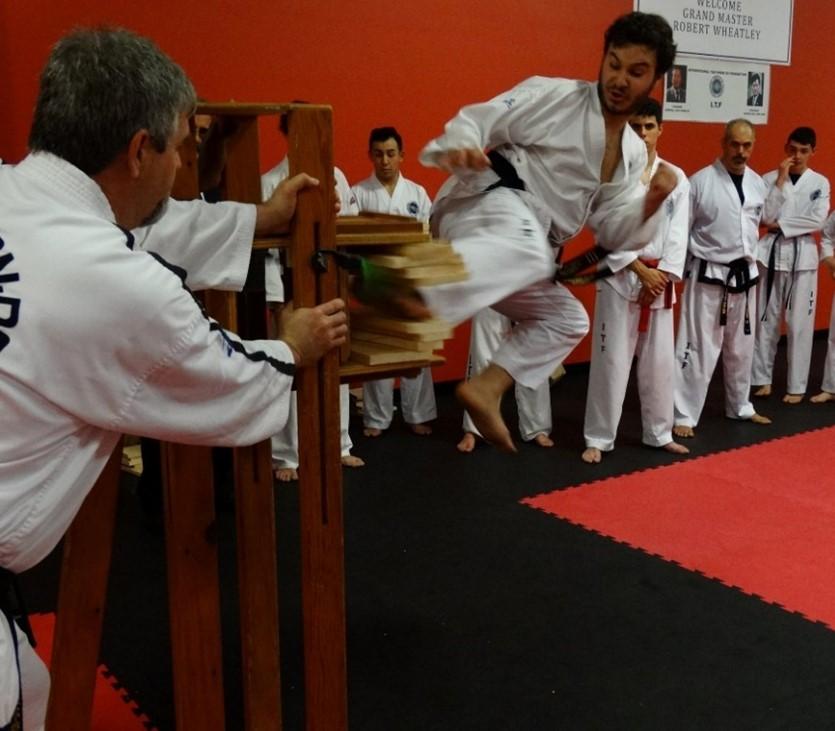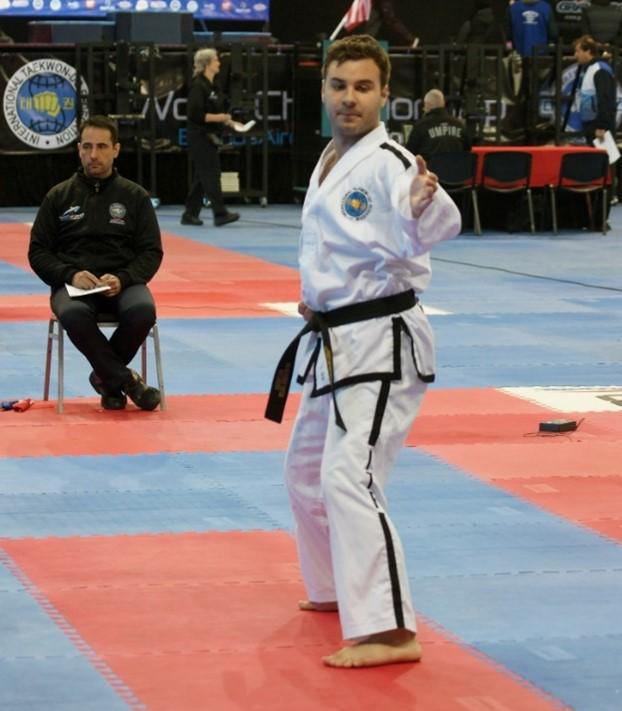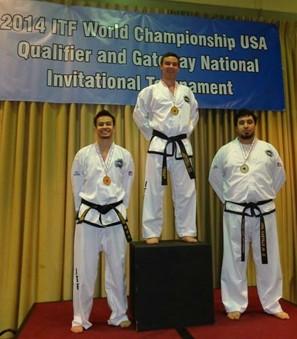
Blog
Breaking Boards and Smashing Goals: How Taekwon-Do Enhanced My Professional Journey

What do Taekwon-Do and engineering have to do with each other? Seventeen years of learning the Korean martial art have taught Ricky Hollenbach about large goal setting, discipline, and more on his way to his fourth-degree black belt and medals at the national and international levels – lessons he applies as he earns a Ph.D. in Mechanical Engineering.
“Can you break four boards with a turning kick?”
“No, coach, but I can break six with a reverse turning kick.”
Minutes later, I stood facing a wall of black plastic boards, faintly hearing “U-S-A, U-S-A” chanting from the rest of our team in the stands. I measured the distance from the board with my leg, took a deep breath, and then performed a kick that I had practiced hundreds of times. I do not even think I felt the boards with my foot as my kick sliced clearly through them. I heard a loud cheer from my teammates, my coaches, and my parents. I had broken all my boards, putting us in a tie for first place.

This was 2012 and I was a member of Team USA. We were in Ottawa, Canada, at the World Taekwon-Do Championship and I was competing in Junior Men’s Team Board Breaking. Each member performed one of four techniques to break a pre-determined number of boards. All three of my teammates successfully broke theirs before it was my turn. With my successful break, we went into a tie for first place with England. Unfortunately, it was late at night, so the tiebreaker was postponed to the next morning. Just like I had to wait, you will have to wait to find out how that story ends.

I have been training for over seventeen years now. I have earned the rank of fourth-degree black belt, which required me to memorize 26 different forms (collection of moves performed sequentially), instruct classes, take four increasingly difficult written tests, and write a five-page thesis. Along the way I joined my Taekwon-Do school’s demonstration team, taught self-defense to students from elementary-school aged to freshmen at the University of Pittsburgh, and earned my international competition judging certificate. My favorite part of Taekwon-Do is competition, with categories of forms, sparring (hand to hand and foot to foot combat), weapons demonstration, and board breaking. Since my first international competition in 2010, I have competed in Canada, Italy, South Korea, Argentina, and multiple states across the US.
Learning Techniques
While my martial arts journey has been long and difficult, it has also been rewarding and improved my professional life as a student researcher. For example, in Taekwon-Do you learn forms or patterns of moves, which increase in difficulty as you test for a higher belt. You need to master the previous techniques before you move on to the next one. In engineering, you must master the principles of one class before you move on to the next one. You cannot jump right into black belt patterns, much like you cannot jump right into Unsteady Aerodynamics or Nonlinear Mechanical Vibrations. In addition, when learning new kicks and punches, students like myself consult instructors or encyclopedias to help us perfect techniques, much like we consult faculty and textbooks when we need to learn new formulas in research. Martial arts has taught me discipline and the ability to learn new things, while also striving to perfect what I already know.

in patterns in Argentina, 2018
Setting Goals
Once patterns are polished and performance-ready, students test for a new belt or compete in a tournament. However, belt testing and national competitions only occur every few years occur. Thus, preparing for these events requires long-term planning plus the ability to break down larger goals into smaller tasks. While preparing, I must perfect my techniques for patterns, adjust my weight for my sparring category, strengthen my hands and feet for board breaking, and fundraise for travel costs. This goal setting with subtasks resembles graduate research projects. To earn a Ph.D., a student must pass courses, complete qualifying and preliminary exams, collect data, and defend a dissertation. Preparing for tests and competitions taught me how to break down goals into smaller manageable tasks.

Performing and Executing
Once goals are identified and preparations completed, the final step is execution. Whether it is a test or a competition, the result is the same: a performance. Not only are multiple black belt judges watching you, but so are the fifty other countries in attendance. To complicate matters, there are often other rings of competition running simultaneously. I can recall in Argentina in 2018, various national anthems were playing for medal distribution during my competition. But through my training and intense focus, I blocked out all distractions mentally. As a result, I won my match against my German competitor. This ability to focus and keep my composure was the same that I displayed during my qualifying examination, and I will draw upon again during my defense. The desire to win and represent my country is enough fuel for my focus and determination; winning medals and earning the next belt rank is not unlike receiving scholarships and fellowships, like the North Carolina State Space Grant or the NSF Fellowship Honorable Mention.

in Houston, Texas in 2014
A Hard-Earned Victory
I promised the ending to my story. Upon returning to the arena the next day, a tiebreaker was held. One member of our team was randomly selected to complete another break. He successfully broke his boards, three with his hand, and then England went next. While they were confident that they could keep up, their team member failed to break all the boards. With that, we were World Champions.
Graduate school is both difficult and time-consuming. It may seem that hobbies compete with research and courses for your time, but it is important to invest in something outside of school. I was a member of the Pitt Taekwon-Do Club during my undergrad and joined the Duke Taekwon-Do Club upon entering graduate school. Hobbies are not only essential for maintaining mental and emotional health, but many can improve physical health as well. Instead of serving as a distraction from my studies, my Taekwon-Do hobby has made me more disciplined in my research and academic pursuits – and more motivated to smash my goals on the way to my Ph.D.

Author

Richard Hollenbach
Ph.D. student in Mechanical Engineering
Richard Hollenbach is a third year Ph.D. student in the Mechanical Engineering and Materials Science Department. He is studying unsteady aerodynamics and vibrations in jet engines and turbines in the Aeroelasticity Laboratory under the direction of Dr. Robert Kielb. He combines wind tunnel testing, computational fluid dynamic simulations, and mathematical models to design tools for engine companies. Richard currently serves as Co-President of the Duke Advanced Degree Consulting Club.